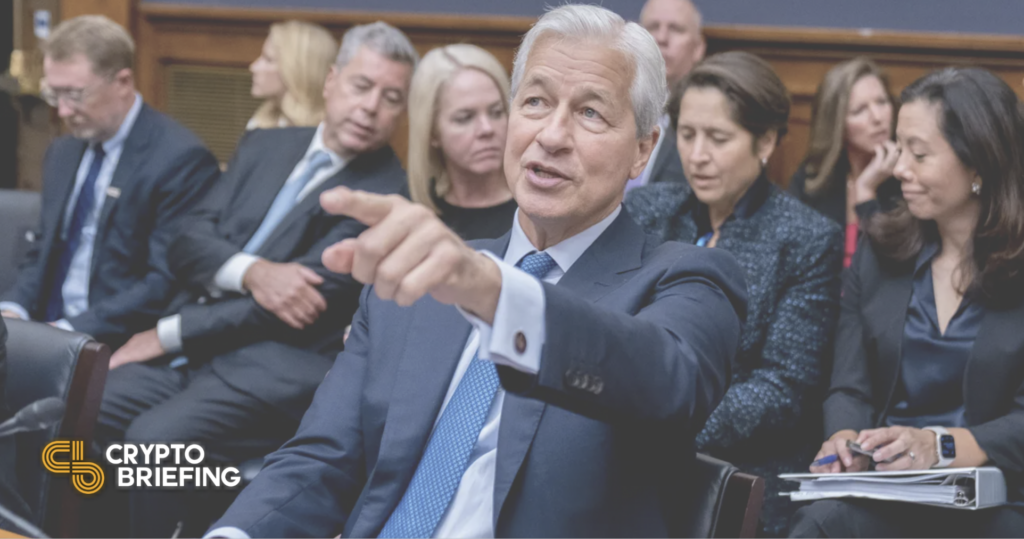
Photo credit AP/Andrew Harnik
Daily Briefing: “Decentralized Ponzi Schemes”
Jamie Dimon made a series of confusing statements about crypto in a Congressional hearing, but reading between the lines may reveal intent.

Powered by Gloria
Dimon described Bitcoin and other crypto tokens as “decentralized Ponzi schemes,” but he was more positive about DeFi and smart contracts.
Dimon Slams Bitcoin
Yesterday, the crypto space was treated to some harsh but perplexing comments from JPMorgan CEO Jamie Dimon. At a Congressional testimony from several top U.S banks, Dimon, who has a track record of flip-flopping on his crypto views, dished out criticism against Bitcoin while also appearing to laud its competitors.
Representative Gottheimer (D-NJ) questioned Dimon on digital assets, asking the banking head for his thoughts on the rapid development of the cryptocurrency sector. Dimon’s response was mixed. He prefaced his comments by separating some digital assets from others. “You have to separate blockchain, which is real, DeFi, which is real, ledgers, tokens that ‘do something,’ deliver information, money, ideas, smart contracts—that’s one thing. I’m not a skeptic,” he explained, before switching to a more severe tone. “I’m a major skeptic on ‘crypto tokens’ which you call currency, like Bitcoin—they are decentralized Ponzi schemes.”
Not satisfied with the Bernie Maddoff comparison, Dimon called out the idea that the average person should be investing in “crypto tokens,” highlighting the use of crypto in several criminal activities such as ransomware, money laundering, sex trafficking, and theft. He finished with a rather abrupt switch to talking about digital dollars, preaching that there would be “nothing wrong with a stablecoin that’s properly regulated,” before taking the opportunity to plug his bank’s own “JPM Coin,” which acts like a dollar deposit.
Dimon’s eclectic mix of comments leaves a lot up for interpretation. Before diving into some more left-field theories, it’s important to note that this isn’t the first time Dimon has lashed out at crypto—specifically Bitcoin. In 2017, he called Bitcoin a “fraud” before backtracking on his comments when JPMorgan looked to launch its own in-house Bitcoin fund in 2021. Now, it seems he’s back on the attack against the top cryptocurrency, although it’s unclear why.
What Is His Endgame?
One theory (and my personal favorite) is that Dimon is trying to bring Congress’ opinions more in line with his bank’s investments in the crypto space. It’s no secret that JPMorgan holds a substantial stake in ConsenSys, one of the leading Ethereum software companies. By promoting DeFi and smart contracts, while criticizing Bitcoin, Dimon appears to be trying to differentiate Ethereum and other smart contract platforms from non-programmable assets.
What’s more, as one of the largest U.S. banks, JPMorgan will want the dollar to maintain its status as the world reserve currency. I think it’s telling that Dimon jabbed Gottheimer with his “which you call currency” line when talking about Bitcoin. My guess is Dimon likes the idea of blockchains such as Ethereum because they can act as rails for USD. Bitcoin, on the other hand, threatens to replace dollars. Iran has already started settling imports using Bitcoin, and Russia has also floated the idea of selling oil and gas for the top crypto.
It’s hard to say what Dimon’s endgame for crypto is or whether it will change again in the future as it has before. In my opinion, the best way to figure out what JPMorgan and the other big banks might be planning is by looking at what would benefit them the most. As they say, money doesn’t lie.
Disclosure: At the time of writing, the author of this piece owned ETH, BTC, and several other cryptocurrencies. The information contained in this article is for educational purposes only and should not be considered investment advice.
